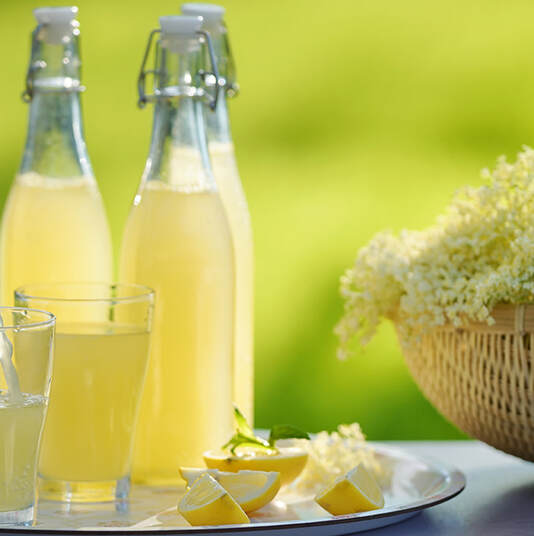Elderflower Simple Syrup
METHOD:
If you are picking elderflowers from the wild, avoid busy roadsides or trees growing downstream from industrial agriculture. This helps reduce risk of commercial toxins.
Do not wash the elderflowers. Gently shake to check for bugs and to remove other particles that are not part of the elderflower. Remove as much of the stems as possibly, you can leave the small pieces of stem directly attached to flower.
In a large pot, add water and sugar. bring to a boil. Add elderflowers and simmer for about 5-10 minute. Remove from heat and let sit. At this point you can either steep for at least 10 minutes, then strain to remove all plant particles or set it aside to steep a few days. Longer steeping will strengthen the flavor, but steeping too long can make it bitter.
Once you have strained the syrup, pour it into clean glass bottles. Syrup will last for several months before sugar begins to crystalize. Use on waffles as syrup or in cocktails and vinaigrettes.
If you are picking elderflowers from the wild, avoid busy roadsides or trees growing downstream from industrial agriculture. This helps reduce risk of commercial toxins.
Do not wash the elderflowers. Gently shake to check for bugs and to remove other particles that are not part of the elderflower. Remove as much of the stems as possibly, you can leave the small pieces of stem directly attached to flower.
In a large pot, add water and sugar. bring to a boil. Add elderflowers and simmer for about 5-10 minute. Remove from heat and let sit. At this point you can either steep for at least 10 minutes, then strain to remove all plant particles or set it aside to steep a few days. Longer steeping will strengthen the flavor, but steeping too long can make it bitter.
Once you have strained the syrup, pour it into clean glass bottles. Syrup will last for several months before sugar begins to crystalize. Use on waffles as syrup or in cocktails and vinaigrettes.
